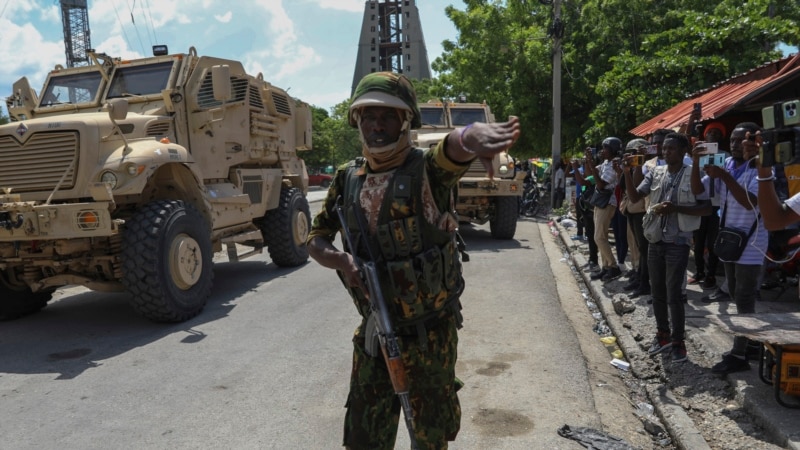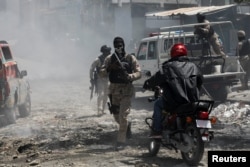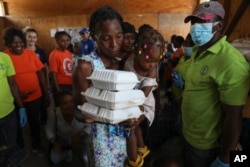
state department —
U.S. Secretary of State Antony Blinken is traveling to Haiti and the Dominican Republic on Thursday, marking his first visits to both Caribbean nations as the top U.S. diplomat.
Blinken’s visit to Port-au-Prince underscores U.S. support for Haiti, with additional humanitarian assistance anticipated as the country grapples with gang violence. His trip to Santo Domingo follows the start of Dominican Republic President Luis Abinader’s second term in mid-August.
A senior State Department official told reporters on Wednesday that the United States is prioritizing efforts with its international partners to set up a structure that ensures “a reliable source of financing and staffing” for a security mission in Haiti.
U.S. President Joe Biden’s administration is reportedly considering the possibility of transitioning a largely U.S.-funded multinational security force into a traditional United Nations peacekeeping operation.
“A formal PKO (peacekeeping operation) is one of the ways that we could accomplish that, but we’re looking at multiple ways to do that,” said Brian Nichols, assistant secretary of state for Western Hemisphere affairs.
With about a month left in the mandate of the U.N.-ratified, Kenya-led Multinational Security Support Mission (MSS) in Haiti, progress has been limited, and many pledges remain unfulfilled.
“The one-year anniversary of the mission is October 2, and we’re going to work to ensure that it’s poised for success and renewal of its mandate in whatever form that takes,” Nichols told VOA on Wednesday.
Multinational security support
Gang-related violence and drug trafficking have fueled political instability and insecurity in Haiti, leading to an unbearable living situation for the Haitian people.

In October 2022, Haiti requested the deployment of an international force to assist the Haitian National Police in combating heavily armed gangs and facilitating humanitarian aid. In October 2023, the United Nations Security Council authorized the MSS.
The United States and Canada are the top funders of the MSS in Haiti. The estimated first-year cost for the mission is $589 million. The U.S. has already provided $309 million — $200 million toward the MSS mission base and $109 million in financial support.
During a visit to Haiti in July, U.S. Ambassador to the United Nations Linda Thomas-Greenfield announced an additional $60 million in humanitarian assistance for the Haitian people, along with providing armored vehicles for the national police.
While in Haiti, Blinken will review the progress made toward improving security and encourage efforts to appoint the provisional electoral council so Haiti can move toward elections, according to the State Department.
Blinken will hold talks with Edgard Leblanc Fils, president of Haiti’s Transitional Presidential Council, and Haitian Prime Minister Garry Conille. Blinken also will meet with MSS head Godfrey Otunge and Normil Rameau, head of the Haitian National Police.
At least 80% of Port-au-Prince is no longer under the control of the Haitian authorities, with violence spreading to other parts of the country.
In the past year, displacement in Haiti has tripled as gang violence grips the Caribbean nation. The United Nations reports that at least 578,000 people have been displaced due to violence, including murders, kidnappings and rapes.

The situation is further exacerbated by widespread hunger, with nearly half of the 11.7 million population facing acute food insecurity.
Gangs, some aligned with political elites, accumulated their control over territory and illicit markets during the tenure of the deeply unpopular former Prime Minister Ariel Henry, who took office after the assassination of President Jovenel Moise in July 2021, according to a Congressional Research Service report. Henry resigned in April 2024 following the formation of a Transitional Presidential Council.
The Dominican Republic
The Dominican Republic will host the 2025 Summit of the Americas, where Western Hemisphere leaders will address shared challenges and policy issues facing the region.
“In the Dominican Republic, we will reinforce our shared priorities such as promoting democratic governance, supporting free and fair elections in the region, and fighting corruption,” Nichols told reporters.
On August 16, President Luis Abinader was inaugurated for a second four-year term. He has vowed to boost security by training more police over the next four years. His administration has barred migrants from neighboring Haiti.
“We certainly hope to see more normal relations between the Dominican Republic and Haiti,” Nichols said. “The countries are inexorably linked, and we certainly will have those conversations with leaders on both sides of the border.”
The U.S. and the Dominican Republic signed a historic Open Skies agreement on August 2. Once in effect, the agreement will expand opportunities for airlines, travel companies and people-to-people exchanges. More than 4 million U.S. citizens visit the Dominican Republic each year.
The Dominican Republic is a crucial partner for the U.S. in hemispheric affairs, due to its position as the second-largest economy in the Caribbean, after Cuba, and the third-largest country by population, behind Cuba and Haiti. The U.S. is its primary trading partner.
Additionally, the Dominican Republic is home to Pueblo Viejo, one of the world’s largest gold mines, and serves as a major global supplier of ferronickel.
The United States said it will continue robust collaboration with the Dominican Republic to advance inclusive economic growth, bolster democratic institutions, uphold human rights, and enhance governance and security.
The Dominican Republic and the United States, along with five Central American countries, are parties to the Dominican Republic-Central America Free Trade Agreement, known as CAFTA-DR. This agreement enhances economic opportunities by eliminating tariffs, opening markets, reducing barriers to services and promoting transparency.
The U.S. Agency for International Development is investing more than $9.5 million to strengthen the Dominican Republic’s existing justice system and to reduce crime and violence.